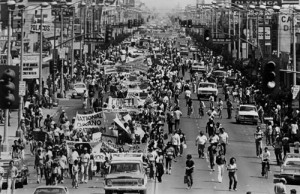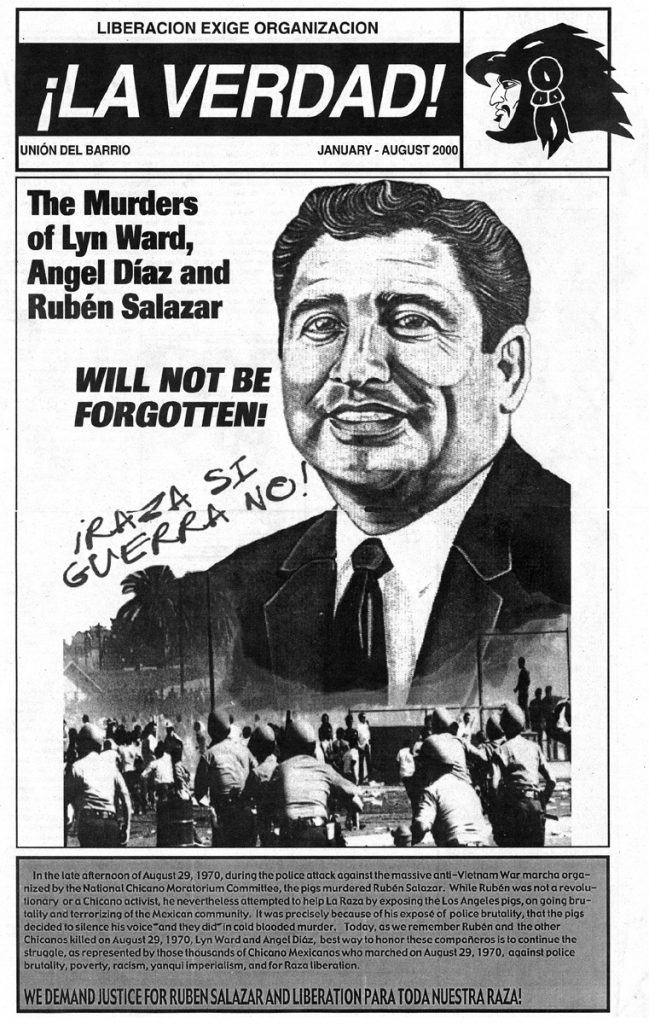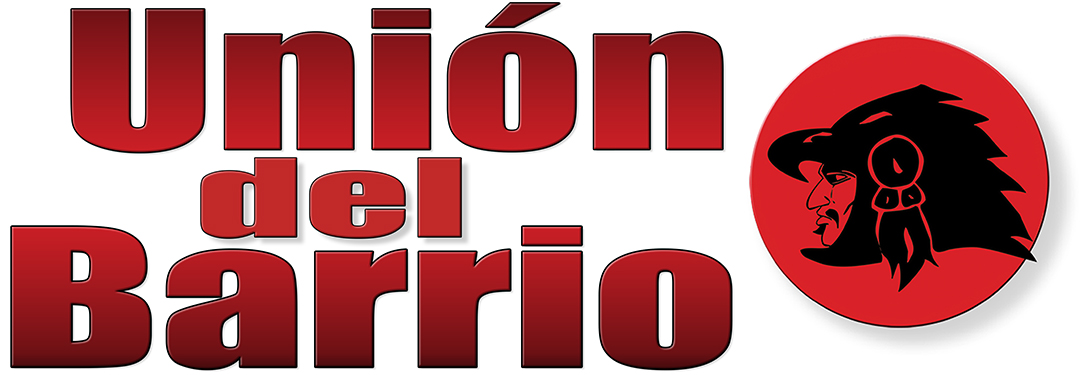August 29, 1970: A Day Every Chicana & Chicano Must Remember
August 29th marks the anniversary of the largest Raza-led mobilization against the U.S. imperialist war in Vietnam, and against the conditions of oppression and exploitation of our historically indigenous people by this colonial settler society on our own land.
 The August 29, 1970, Chicano Moratorium was the culmination of many pickets, teach-ins, and marches/rallies throughout Aztlan. During that historic year, calls for Chicano Power were raised in unison with those for Black Power, Indigenous Power, and national liberation movements throughout the hemisphere, as well as revolutionary fervor worldwide.
The August 29, 1970, Chicano Moratorium was the culmination of many pickets, teach-ins, and marches/rallies throughout Aztlan. During that historic year, calls for Chicano Power were raised in unison with those for Black Power, Indigenous Power, and national liberation movements throughout the hemisphere, as well as revolutionary fervor worldwide.
Yet, we must not forget that the day ended with a brutal repression in East LA. That day in 1970, our movement for Chicano Mexicano self-determination was viciously attacked by organized state violence carried out by the Los Angeles Police Department, LA County Sheriffs, and California Highway Patrol, under the direction of the FBI’s COINTELPRO initiative.
The attack against our movement had been planned for months and led to thousands being injured, hundreds arrested, and several people killed. The police-led assassinations of Brown Berets Lyn Ward and Angel Diaz, and the respected journalist Ruben Salazar, were each meant to serve as a message to our movement that the state would use all of its means to silence our calls for self-determination.
 Ruben Salazar was well known for his news reports on KMEX and the Los Angeles Times. His reports often exposed racism and brutality in law enforcement against the Chicano Mexicano community. He was subsequently killed in the Silver Dollar Cafe on Whittier Blvd. The sustained attack against the organized group of young Chicanas/os known as the Brown Berets (Angel Diaz and Lyn Ward) as well as the voice of Chicanas/os in the reporting of Ruben Salazar, is evidence of how the the system was in a situation where the only way to “deal” with our people was to disrupt our political events through the use of surveillance, infiltration, and state violence.
Ruben Salazar was well known for his news reports on KMEX and the Los Angeles Times. His reports often exposed racism and brutality in law enforcement against the Chicano Mexicano community. He was subsequently killed in the Silver Dollar Cafe on Whittier Blvd. The sustained attack against the organized group of young Chicanas/os known as the Brown Berets (Angel Diaz and Lyn Ward) as well as the voice of Chicanas/os in the reporting of Ruben Salazar, is evidence of how the the system was in a situation where the only way to “deal” with our people was to disrupt our political events through the use of surveillance, infiltration, and state violence.
We emphasize that our people did not sit idly that day while they were beaten and shot. Many people fought back along Whittier Boulevard, and eventually ran the police and sheriffs out of the barrio. It was one of the most significant events and acts of resistance in our history, and it also marked a pivotal moment in the seventies, occurring at the height of the Chicano Power movement. This mobilization represented an act of organized resistance by la Raza in the 1970s and contributed to the movimento advancing its own political agenda on our own terms.
There Are Some That Prefer To Forget August 29, 1970
So why is it that this date is no longer given much attention by many of our current political “leaders”? Why do many of our “younger activists” (and too many of our older ones — who should know better) only dedicate a moment of passing interest to this historical date?
There are numerous reasons why some in the current struggle prefer to sweep this history of resistance under the rug. One reason that is often given for not upholding the Moratorium is that it was too many years ago, and is “no longer relevant.” Some also argue that the “Chicano movement is dead,” or that “times have changed and the rhetoric and tactics of the past are no longer useful,” only relevant to “chicanosauruses.” Some even argue that we have to “move beyond” the “narrow politics” of the 1970s. Other “voices of moderation” prefer that we “stay on point and keep the message short and simple.”
Finally, we have those forces who tell us that the Chicano Moratorium and any manifestation of Chicana/o Power politics is narrow and “sectarian,” and keeps us from building unity with potential “allies.” Dismissing Chicana/o history as “sectarian” is a code for not wanting to upset the current political order, the Democratic Party, its apologists, or its affiliates. Usually, “voices of moderation” are more about using our movement as leverage to win political favors from elected officials than they are about building alliances or advancing the struggle.
What Happens When A Movement Loses A Sense Of Its Own History?
When we begin to lose our sense of history, we see it replaced by social media-dependent campaigns, with few (if any) calls to build a liberation-oriented, community-based organization, and no calls for independent political power. Protesting does take place, but it is usually within the parameters and frameworks established by the existing political parties (usually Democrats). It is then used to promote agendas to reform the existing capitalist order. Today, we do have activism and marches, but also arguably less collective political power than during the 1970s.
One clear example of how our movement has lost political power is apparent in how we have been crushed by the so-called “immigration debate” during the last 35 years. During the 1990’s we were told that our movement should concentrate on fighting the “racist” Republicans; meanwhile, the policies the Democrats enacted under the Clinton/Obama administrations oversaw the neoliberal implementation of the North American Free Trade Agreement (NAFTA), imposed the largest militarization of the border, the highest number of deportations, and pushed for the mass incarceration of our communities. Still, many raza were convinced that pursuing citizenship and voting as Democrats were the only politically viable options for our communities. When Unión del Barrio argued that our priority must be to build a revolutionary organization for working-class Raza, our ideas were often dismissed as radical rants left over from the 1970s. This is no longer the case today.
If we lose our historical memory, then is becomes impossible to remember that even before the 1990s there was loud racist rhetoric about “anchor babies,” revoking the 14th amendment, the need for massive deportations of millions of raza, building a border wall from California to Texas, etc., but it mostly came from white nationalist groups like “White Aryan Resistance,” “American Spring,” or the “Minutemen.” Today, racist talking points like these are federal policy actions, essential applause lines for Trumpistas, every Republican, and more than a few Democrats – “build a wall” and “paint it black” are not new slogans by any means.
Democrats and Republicans continue to provide concrete evidence showing us how far both parties are willing to take their attacks against our people – way beyond just anti-Mexican rhetoric about “anchor babies.” Democrats and Republicans both participated in building a global political economy and that benefits capitalism and imperialism under the twin banner of the “war on drugs” and the “war on terror”:
- the massive and violent deportation campaign against our peoples;
- the continued impunity of federal agencies like ICE;
- the ongoing genocide against the Palestinian people;
- multiple wars throughout the world;
- the increased militarization of the U.S./Mexico border;
- the increased militarization of Mexico’s southern border with Belize and Guatemala;
- economic-military plans to attack Raza workers from El Salvador, Honduras, and Guatemala.
Trump intensifies his war against our communities. White nationalists attack us. Aggressively anti-Mexican policies are enacted, and their authors are celebrated, promoted, and pardoned. Look at the contrast between this and 1970, when on August 29th, 30,000 Raza marched in the streets against the genocidal U.S. war in Vietnam, demanding better education, jobs, and community-based power. These examples illustrate one root of the numerous problems our communities face within what is broadly defined as “our struggle.” Sadly, “our struggle” is too often described in terms of how the existing political order perceives us, and rarely in terms of how we perceive ourselves.
Why We Must Uphold August 29th Now More Than Ever
Often, we hear talk about the “dumbing down” of this media-saturated society. Our movement internalizes the consequences of this “dumbing down” when we lose awareness of our collective history. We have to ask, what good does it do to have 30,000 people in the streets marching, if they are marching primarily to demand acceptance into the existing political and economic order, or where active political participation is measured on “likes,” “shares,” and 130 characters on the screen of some mobile device, without any political accountability to an organization or collective of people.
The most urgent task of our struggle is to take the events of August 29, 1970, out of the time capsule or mausoleum and bring their lessons into our current work and the struggles of today. It is to make the Moratorium a part of our everyday struggle for liberation and self-determination. Today, as we did in 1970, we must unite to reject all imperialist wars and refuse to participate in them (even in exchange for a green card). Instead, we must demand that this settler state and its agents of repression show us their “immigration papers.”
We must accept what history has proven – that Democrats and Republicans represent two heads of the same monster. We must mature politically, and accept the urgent need to forge an independent organization for liberation, self-determination, and Participatory Democracy on our own land. We must fight to reclaim the value of our labor, protect our water and Mother Earth, and build a viable and sustainable future. We must struggle and unite against all forms of imperialist aggression, notably that aggression which threatens twenty years of progressive gains throughout Nuestra América, despite the lies the mainstream media likes to spread. Finally, we must unite with the rest of humanity to overturn the parasitic economic relationship that U.S. society enjoys at the expense of the rest of the world.
This is what August 29, 1970, should teach us about the present, and this is the banner that we carry as Unión del Barrio on this day, our anniversary, since our organization was founded on August 29, 1981, to commemorate this important date.
These are the lessons and the tasks that those of us who are serious about changing the conditions we live in must be willing to contend with. We need to sacrifice, unite, and organize as compas en la lucha on this 29th of August, and every other day, wherever in Aztlan we happen to be.
On August 29th, we proudly hold fast to our historic task of bringing our people into the liberation struggle, organizing for the self-defense of our community, building dual and contending spaces of struggle, and uniting with the poor and working class of Nuestra América.
Que Viva la Moratoria Chicana
Abajo el Imperialismo Yanqui
Todo Poder al Pueblo
The video “20 Years Y Que” was produced by the Los Angeles Region of the National Chicano Moratorium Committee (LANCMC) after the 20th Commemoration of the Chicano Moratorium in 1990. This 28 minute video provides a very good overview of the history and significance of the events of 1970, as well as a strong argument why it is important to to continue to build the struggle. Although at the time of the production of this video Unión del Barrio played a central leadership role within the NCMC, we include the video here for its historical value, and in no way claim that it was created by Unión del Barrio.
Updated August 28, 2018, August 28, 2025.




